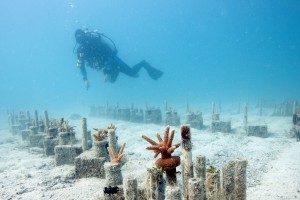
Coral Reef Restoration
Seeking to develop systems and techniques to grow coral and other reef species.
1600 Ken Thompson Parkway
Sarasota, FL 34236
Ph: (941) 388-4441
Hours: 10AM - 5PM
A 501(c)3 nonprofit organization.
Benthic ecology is the study of organisms that make up bottom communities (sediments, seagrass communities and rock outcrops) in lakes, streams, estuaries and oceans, to determine environmental health and conduct environmental impact studies. The Mote Benthic Ecology Program has conducted many projects primarily using benthic invertebrates to assess the environmental health of areas or regions.
Certain species of invertebrates are representative of a healthy environment, while others may tolerate and be representative of environmental stresses, such as thermal effluents from power plants, excess nutrients or chemical contaminants, alterations of the bottom by dredging or sedimentation and disruption of habitat by alteration of freshwater inflows.
Recently the Program has partnered with other organizations to conduct research related to the survival and restoration of the bay scallop (Argopecten irradians) to Sarasota Bay. The program is in the process of constructing a bay scallop nursery to provide juvenile and adult scallops to Sarasota Bay.
The benthic program provides environmental characterization and impact studies for government agencies and industry. The program has been involved in habitat surveys including seagrass mapping and bathymetry surveys, benthic biodiversity surveys, artificial reef surveys, coordination of multidiscliplinary studies of power plant impacts, assessments of the upper estuarine invertebrate zonation of tidal rivers, assessment of the impacts of beach restoration, impacts of mosquito larvicides on non-target invertebrates, effects of red tide events on invertebrates, assessment of offshore sand mining, and a variety of other environmental surveys.
The Program has also conducted seagrass and reef mapping, sediment coring, long-term measuring of physical field parameters such as salinity, temperature, weather, and currents.
Benthic Ecology staff also provide invertebrate identification services, and environmental monitoring support such as turbidity monitoring, salinity and dissolved oxygen monitoring, collection and analysis of water current speeds and circulation data and assist with the collection of water quality data for Mote’s state certified environmental water quality laboratory, the Environmental Chemistry Program. The program can also provide expertise in scientific scuba diving in accordance with American Academy of Underwater Sciences (AAUS) rules for scientific diving. Mr. Culter developed the Mote Diving Program and brought Mote into compliance with AAUS and EPA diving standards.
Benthic research at Mote dates to 1978.